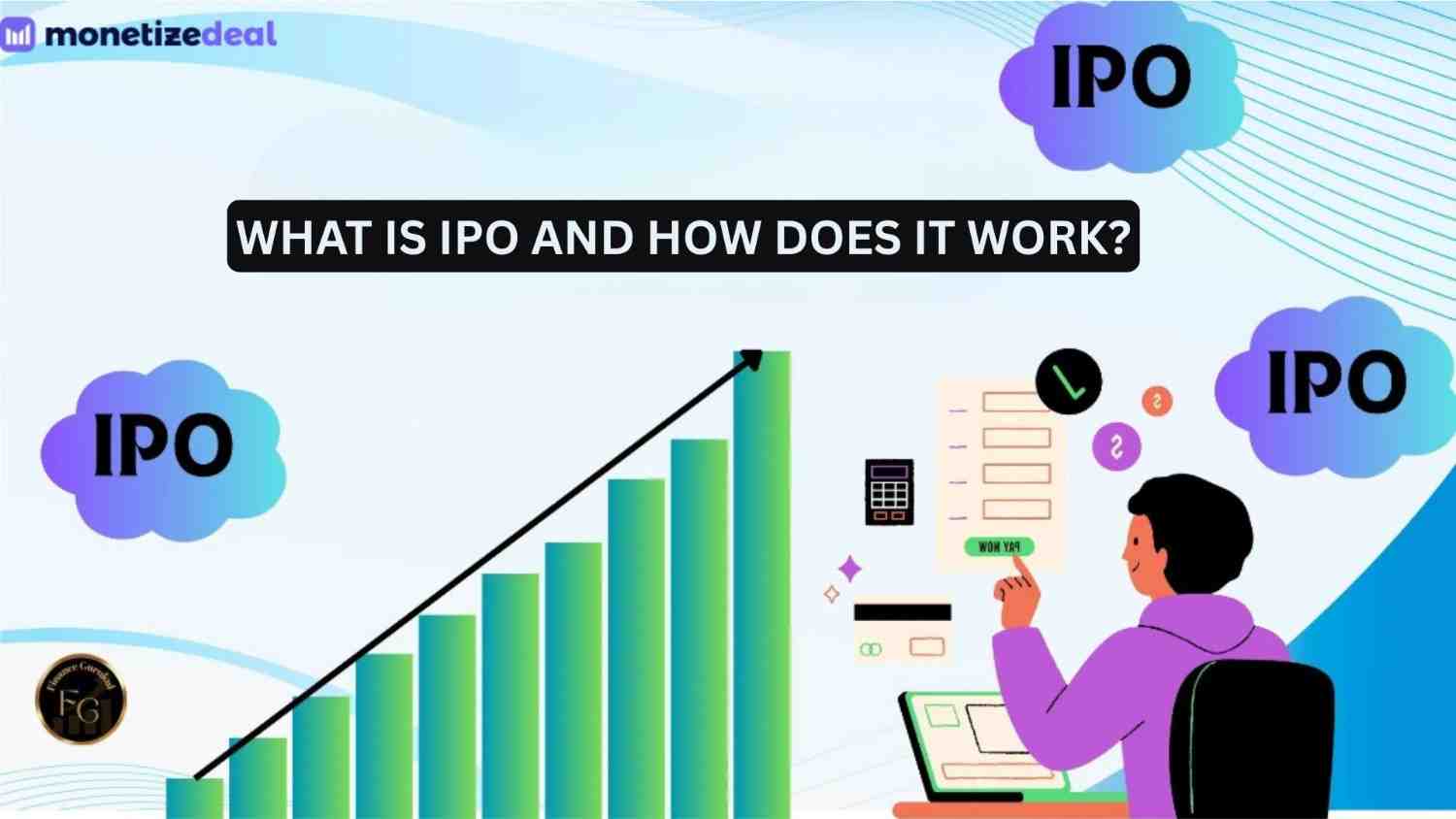Finance
What is IPO and How Does It Work

Last Updated on February 13, 2026 by Harsh Rajput
Initial Public Offering(IPO) is a switch that a private company makes to transform into a public company. They do so by making their shares available to the public for the first time. When a private company sells a portion of its shares to the public, it is able to raise capital, pay off debts, fund new projects and expand its growth. This switch helps smart investors to return high returns on their investments and benefit from the company’s expansion.
This decision is not made overnight and requires some key steps to be followed. Only after the IPO is done can the company’s shares can be listed and freely traded in the market. For investors, this is a major opportunity to invest in shares of reputable companies that were previously unavailable to them and to maximize their profits.
Types of IPO
There are primarily two types of IPO – Fixed Price Offering and Book Building Offering. Let us closely look at what they mean:
- Fixed Price Offering
In the fixed price offering, the share price is already set by underwriters and companies before the IPO opens. The underwriters already know the exact price before applying for IPO by analyzing the financial data of the company. The price of the share remains constant throughout the IPO process, which means investors cannot influence the share price by bidding.
- Book Building Offering
In the book building offering, the company provides a price band to investors within which they can bid their offerings. The lowest value is called the floor price whereas the highest value is called the cap price. The final price of the share is determined by demand and this method is more flexible than the fixed price method.
How does IPO work?
As we discussed above, IPO involves a whole journey for a company to make its shares available for the public investors to invest in. This procedure requires crucial steps to be followed by companies which are:
- Hire Investment Bank or Underwriters
The companies first hire an investment bank or underwriters to manage the IPO process and analyze different things. Underwriters or investment banks help companies assess their financial health, set share prices, ensure legal compliance and connect them to potential investors.
- Prepare for IPO Registration
The next important thing is to get the registration process done which includes preparing legal documents like the Draft Red Herring Prospectus. This gives a detailed description of the company like financial information, risk factors, business model etc. These documents have to be submitted to the Local Registrar of Companies at least three days before the offer.
- SEBI Verification and Approval
The documents are then reviewed and verified by SEBI to check if they comply with their guidelines or not. Once SEBI approves the documents and gives the green light to the company, they can go ahead with the IPO process.
- Stock Exchange Listing
Another crucial step that follows upon approval is that companies have to finalize the stock exchange where they will list their shares. For this, the companies can decide to list shares on both BSE and NSE.
- Roadshows and Marketing
Companies conduct various roadshows, media campaigns, investor presentations, etc to promote IPO to potential investors and generate interest in their offering.
- Setting the IPO Price
The price is fixed mainly by following two methods – the Fixed Price method and the Book Building method. Under the fixed price method, the companies sit with underwriters to set the price after analysing various details. The book building method involves fixing the price depending on demand, received bidding, target capital, etc.
- Going Public
Once the shares are allocated, they are open to trade freely on the stock exchange and officially mark the company’s transition into a public traded company.
- Post IPO
It becomes important for companies to regularly provide financial and operational updates to the stock exchange and investors. This also demands the company to provide information of quarterly earnings, meet investors’ expectations and follow strict regulations.
Is IPO Beneficial or not?
IPO can be both beneficial and risky for companies to grow and get access to capital for their future endeavours. However, they also come with a cost and regulatory burdens. Let us discuss these in detail by taking a look at their advantage and disadvantages.
Advantages of IPO
- Brand credibility and Recognition – Being a public company and having its shares listed on the stock exchange, companies are able to attract the right investors. With the perfect media coverage, companies strengthen their market presence and reputation.
- Access to Capital – IPO allows companies to generate funds and raise capital from the public and use it for their own expansion. This can include repaying debts, investing in new products, new technologies, etc.
- Provides Liquidity to shareholders – IPO enables early investors to sell their shares in the open market and convert equity into cash easily. This not only allows flexibility of monetising their holdings but also helps them diversify their investments.
- Valuation Transparency – IPO helps to establish a transparent market valuation of the company by letting the investors decide the share price. Since evaluation happens openly and not behind closed doors, companies can help evaluate their financial positions, performance and growth.
Disadvantages of IPO
- High Costs – IPO can be extremely expensive as it involves a lot of costs to be paid for hiring investment banks, legal and accounting fee, compliance and listing fee, etc.
- Strict and Heavy Regulation – Once a company becomes public, it has to follow certain strict rules and regulations which can be challenging. It is required to submit quarterly earnings, annual reports, financial statements, etc, which increases workload but also legal risk.
- Market Volatility – After listing, the company’s valuation becomes exposed to daily market fluctuations like economic conditions, investor sentiment/reactions, market mood etc. This can make it challenging for management to deal with short term pressure rather than focusing on long term strategies.
- Lock in Periods – Sometimes, certain shareholders like venture capitalists, company insiders, early investors, etc can be restricted from selling their shares for a few months. This can impact their ability to liquidate their holdings immediately after listing and delay their access to cash.
Key Terms Associated with IPO
- Underwriter – This refers to a bank, financial institution or broker that companies hire to assist them in underwriting stocks. An underwriter takes care of setting the price, targeting potential investors and subscribing to shares if they are not picked up by investors.
- Issuer – Issuer refers to the company that has decided to offer its shares to the public for the first time.
- Price Band – The price band is the range within which the value of a share is decided for investors to bid on. This basically is like a price bracket for the share deciding the lowest and highest price between which the bidding on the share will remain.
- Under Subscription – When the demand for shares is less than the number of shares made available to the public.
- Over Subscription – When the demand for shares is more than the number of shares offered to the public, leading to partial allotment.
- Green Shoes Option – This refers to the over allotment of shares than previously planned by the company. Sometimes the demand for shares can be higher than what was originally expected.
Eligibility Criteria for Offering IPO
For companies to offer an IPO, they should meet some of the following criteria:
- Minimum Financial Record – A company should have a stable financial history and at least three years of business operations.
- Tangible Assets – The company should have at least Rs 3 crore in net tangible assets and not excessive liabilities to be able to offer an IPO.
- SEBI Regulation – Since SEBI is the top regulatory body in India, it is important that companies comply with all the guidelines provided by SEBI before offering an IPO.
- Revenue – If a company has adopted a new name, at least 50% of the total revenue generated in the previous year should come from activities performed by the company after adopting the new name.
Conclusion
An IPO marks a crucial step in the life of a company where it transitions from being a privately held company to a publicly traded company. This transition is a major financial step taken towards the company’s growth by raising capital from a pool of investors. IPO not only contributes to the company’s expansion by increasing its market presence, but also benefits investors looking to diversify their investments. It provides an early opportunity to investors to leverage the company’s profit and growth. Overall, an IPO opens new doors of success for both companies and investors.
FAQs
1. What do you mean by IPO?
An IPO basically means that a company offers shares of its company to the public for the first time. The public invests in company shares and earns profit from the company’s growth.
2. Are IPO investment risky?
Yes, IPO can be risky especially considering they are highly volatile. Sometimes the price can drop after listing or there can be no guarantee of allotment due to the market demands. Overall, poor company performance, negative market conditions and increased competition are some factors associated with the risk of IPO.
3. Who can invest in IPO?
There are different types of investors that underwriters aim to promote a company’s IPO to and some of these include Institutional investors, High net worth individuals and Retail investors.
4. Why do companies choose to go public?
The decision for a company to switch from private to publicly traded company can involve certain reasons. Some reasons behind this transition is that the company looks forward to expanding, raising capital for future projects, paying off debts or increasing brand visibility and credibility.
5. Can an IPO fail?
Yes, there might be a chance of an IPO failing if not enough investors are attracted to the company’s shares or if the price does not meet investors’ expectations. In such cases, the company can withdraw IPO altogether or postpone it.

Muskan Sinha is a creative and passionate content writer, skilled at delivering high quality , engaging and SEO friendly content across diverse niches. With a zeal for storytelling and great critical thinking, she delivers clear, informative and impactful content that boosts audience engagement.

-

 List1 year ago
List1 year ago50 Best Telegram Channels For Movies and Web Series
-

 List6 months ago
List6 months ago20 Best Telegram channels for viral video link
-

 List1 year ago
List1 year ago50 Best Money Earning Apps in India Without Investment
-

 Finance1 year ago
Finance1 year ago10 Best Telegram Channels for Forex Trading Signals
-

 List2 years ago
List2 years ago500+ Funny YouTube Channel Name Ideas for 2026 | List of Top Comedy Channel names
-

 List2 years ago
List2 years ago25 Best Telegram Channels for Stock Market, Bank Nifty and Intraday Trading
-

 List2 years ago
List2 years ago20 Best SEBI Registered Telegram Channels in India 2026
-

 List1 year ago
List1 year ago120 Best Telegram Channel Links to Join in 2026



















